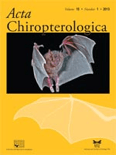
ACTA CHIROPTEROLOGICA
Scope & Guideline
Connecting Research and Conservation for Chiroptera
Introduction
Aims and Scopes
- Biodiversity and Conservation:
The journal focuses on documenting bat diversity across various ecosystems and geographic regions, highlighting conservation challenges and strategies necessary for the protection of bat species. - Behavioral Ecology:
Research on the behavioral patterns of bats, including foraging, roosting, and social interactions, is a core area of interest, contributing to our understanding of their ecological roles. - Physiological and Morphological Studies:
Studies investigating the physiological adaptations and morphological variations of bats provide insights into their evolutionary biology and ecological niches. - Impact of Anthropogenic Factors:
The journal addresses the effects of human activities, such as habitat destruction and climate change, on bat populations and their habitats, promoting awareness and advocacy for sustainable practices. - Innovative Research Methodologies:
ACTA CHIROPTEROLOGICA encourages the development and application of novel methodologies in bat research, including acoustic monitoring, genetic analyses, and ecological modeling.
Trending and Emerging
- Climate Change Impacts:
An increasing number of studies are addressing the implications of climate change on bat populations, including shifts in breeding timing, habitat use, and population dynamics, underscoring the urgency of understanding these effects. - Conservation and Management Strategies:
Emerging themes focus on innovative conservation strategies, such as the use of green infrastructure (e.g., bat bridges) and habitat management practices, highlighting a proactive approach to bat conservation. - Ecological Interactions and Networks:
Research exploring the interactions between bats and other species within ecosystems, such as prey relationships and symbiotic associations, is gaining traction, revealing the complex roles bats play in biodiversity. - Technological Advances in Monitoring:
The use of advanced technologies, including acoustic monitoring and genetic barcoding, is becoming more prevalent, allowing for more precise and effective studies of bat ecology and behavior. - Anthropogenic Effects on Bat Ecology:
There is a growing focus on understanding how human activities influence bat behavior and ecology, particularly in urban and modified landscapes, which is critical for developing effective conservation measures.
Declining or Waning
- Traditional Taxonomy and Classification:
There has been a noticeable decline in papers solely focusing on classical taxonomic revisions and classifications, as the field shifts towards integrative approaches that combine genetic, morphological, and ecological data. - Historical and Paleontological Studies:
Research centered on historical or paleontological aspects of bats seems to be less frequent, likely due to a growing emphasis on contemporary ecological challenges and conservation issues. - Localized Studies without Broad Implications:
Fewer studies are being published that focus narrowly on localized bat populations without considering broader ecological or conservation implications, indicating a shift towards more globally relevant research.
Similar Journals
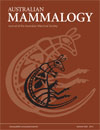
AUSTRALIAN MAMMALOGY
Illuminating the Interactions of Mammals and Their EcosystemsAustralian Mammalogy, published by CSIRO PUBLISHING, is a pivotal journal in the fields of Animal Science and Zoology as well as Ecology, Evolution, Behavior and Systematics. With its ISSN 0310-0049 and E-ISSN 1836-7402, this esteemed journal has been instrumental in disseminating critical research findings since 2000, and continues to evolve up to 2024. Ranked in the Q2 quartile of both its categories for 2023, it showcases a diverse array of studies that contribute to understanding Australia’s unique mammalian fauna and its ecological dynamics. Researchers, professionals, and students will find valuable insights in its peer-reviewed articles, which are essential for advancing knowledge in these essential scientific disciplines. Located in Australia at UNIPARK, Locked Bag 10, Clayton, VIC, this journal remains committed to fostering scholarly communication within the global scientific community.

Neotropical Biology and Conservation
Advancing Knowledge for a Sustainable NeotropicsNeotropical Biology and Conservation, published by Pensoft Publishers, serves as a pivotal platform for researchers and professionals dedicated to the understanding and preservation of biodiversity in the Neotropical region. This Open Access journal, operational since 2006 and based in Brazil, invites contributions that delve into the complexities of ecology, evolution, and conservation strategies pertinent to the diverse ecosystems of South and Central America. With a commendable 2023 impact factor reflected in its Q3 rankings across multiple categories including Animal Science, Ecology, and Plant Science, it stands as a valuable resource for academics seeking to publish innovative findings and foster dialogue in these critical areas of study. The journal's commitment to open access ensures that knowledge is readily available to anyone interested in advancing the field of neotropical biology and conservation. Join the global conversation and contribute to the vital work of preserving our planet’s rich biological heritage through rigorous research published in this esteemed journal.
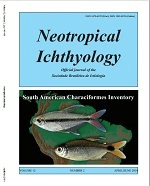
Neotropical Ichthyology
Connecting scientists to safeguard aquatic life in the Neotropics.Neotropical Ichthyology is a prestigious open-access journal published by the SOC BRASILEIRA ICTIOLOGIA, dedicated to advancing the field of ichthyology within the Neotropical region. Since its inception in 2003, the journal has provided a vital platform for researchers, professionals, and students to disseminate significant findings related to fish biology, ecology, and conservation. With an impact factor that is reflected in its impressive Q1 ranking in Animal Science and Zoology and Q2 rankings in both Aquatic Science and Ecology, Evolution, Behavior and Systematics, it stands as a leading resource for cutting-edge research. Located in Brazil, at the UNIV SAO PAULO, the journal not only contributes to scientific knowledge but also fosters collaboration among ichthyologists dedicated to the rich aquatic biodiversity of the Neotropical region, ensuring that critical insights into fish species, habitats, and conservation strategies are accessible to a global audience.

Journal of Wildlife and Biodiversity
Connecting scholars for a greener tomorrow.Journal of Wildlife and Biodiversity, published by Arak University in Iran, is an Open Access journal that has been contributing to the fields of wildlife science and biodiversity since its inception in 2017. With an E-ISSN of 2588-3526, this journal serves as a vital platform for researchers, professionals, and students alike, dedicated to disseminating significant findings related to animal sciences, ecology, and environmental conservation. Despite its current Q4 ranking in various categories (Animal Science, Ecology, and Nature and Landscape Conservation) according to the 2023 metrics, the journal's commitment to advancing knowledge in wildlife and biodiversity remains unwavering. Although the journal's Scopus coverage has been discontinued since 2024, it continues to cater to a wide audience by promoting innovative research and fostering collaborations in the academic community, ultimately aiming to enhance understanding and conservation strategies for wildlife and their habitats.

AMPHIBIAN & REPTILE CONSERVATION
Preserving Nature's Wonders Through Innovative ResearchAMPHIBIAN & REPTILE CONSERVATION, published by the Amphibian Conservation Research Center & Lab, is a leading journal dedicated to the field of herpetology and environmental conservation. With an ISSN of 1083-446X and an E-ISSN of 1525-9153, this journal serves as a vital resource for researchers, conservationists, and students interested in the preservation of amphibian and reptile species. The journal has achieved remarkable rankings, categorized in the Q2 quartile for Animal Science and Zoology, Ecology, and Nature and Landscape Conservation as of 2023, reflecting its significant contribution to the scientific community. Over the converged years from 2016 to 2024, the journal has established itself as an integral platform for disseminating research findings, fostering collaboration, and enhancing the understanding of biodiversity and ecosystem dynamics. By embracing an open-access approach, AMPHIBIAN & REPTILE CONSERVATION ensures that critical research is readily available to a global audience, promoting informed conservation efforts and policy advocacy to safeguard these vital species amidst their declining populations.
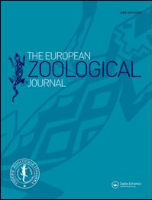
European Zoological Journal
Elevating the Study of Animal Sciences Across EuropeEuropean Zoological Journal, published by Taylor & Francis Ltd, is an esteemed open-access publication dedicated to advancing the exciting field of zoology. Since its inception in 2017, this journal has progressively established itself as a vital resource for researchers, professionals, and students alike. With its Q2 ranking in Animal Science and Zoology as of 2023, the journal ranks in the 69th percentile among its peers, showcasing its influence and contribution to the discipline. The journal’s broad scope covers a wide range of topics within zoology, aiming to foster an understanding of animal biology and conservation efforts. As an open-access journal, it not only enhances the dissemination of knowledge but also encourages collaborative research across global communities. Situated in the United Kingdom, the European Zoological Journal invites submissions that contribute to the evolving discourse in animal sciences, and endeavors to support the scientific community in addressing pressing ecological challenges.

COLEOPTERISTS BULLETIN
Unveiling the Secrets of Beetle DiversityCOLEOPTERISTS BULLETIN is a pivotal journal in the field of insect science, particularly focusing on the fascinating world of beetles. Published by the COLEOPTERISTS SOC, this journal disseminates high-quality research, illustrations, and literature reviews since its inception, with contributions spanning from 1988 to 2024. Though classified in Q3 of the insect science category as per the 2023 quartiles, it holds significant value for researchers, professionals, and students alike, offering insights into agricultural and biological sciences with an emphasis on coleopteran diversity and ecology. Based in the United States at the University of Georgia, this journal serves as a hub for scientific dialogue and advancements in the field. While it currently does not offer open access, its rigorously peer-reviewed articles ensure that cutting-edge research reaches a dedicated audience, promoting a deeper understanding of beetles' ecological roles and contributions to biodiversity.

RUSSIAN JOURNAL OF HERPETOLOGY
Connecting Research and Conservation in HerpetologyRUSSIAN JOURNAL OF HERPETOLOGY is a prominent scholarly publication dedicated to the field of herpetology, focusing on the study of reptiles and amphibians. Published by FOLIUM PUBL CO in the Russian Federation, this journal aims to foster the exchange of knowledge and research in animal science, ecology, evolution, and behavior. With its ISSN 1026-2296 and a significant commitment to high-quality academic discourse, the journal maintains a respectable standing within the Q3 quartile in both Animal Science and Zoology, as well as in Ecology, Evolution, Behavior, and Systematics. This attributes to its Scopus rank among leading journals in related fields, enhancing its visibility and influence. Spanning from 2014 through 2024, it publishes rigorous research that explores the diversity, biology, and conservation of herpetofauna, making it a vital resource for researchers, professionals, and students alike who are invested in the ecological and evolutionary dynamics of these species.
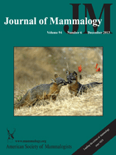
JOURNAL OF MAMMALOGY
Pioneering Research in Mammalogy and ConservationJournal of Mammalogy, published by Oxford University Press Inc, is a premier journal dedicated to the field of mammalogy, providing a key platform for researchers and professionals interested in the biology, ecology, and conservation of mammals. With a prestigious impact factor reflected in its Q1 ranking in Animal Science and Zoology, and multiple Q2 rankings in related categories such as Ecology and Genetics for 2023, this journal is recognized for its significant contribution to advancing knowledge in the discipline. The journal features rigorous peer-reviewed articles, ensuring high-quality research output valuable for students, academia, and conservation efforts alike. While not an open-access journal, it offers comprehensive subscription options for institutions and individual readers, promoting accessibility to critical findings in the realm of mammal research. Established in the earlier years of the 20th century, the Journal of Mammalogy has continuously evolved, serving as an integral resource for disseminating innovative studies and insights that drive the future of mammalian sciences.
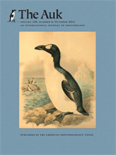
Ornithology
Pioneering Insights into Bird Behavior and Ecology.Ornithology, published by Oxford University Press Inc, is a premier journal dedicated to the field of avian biology, offering a platform for researchers, professionals, and students to share groundbreaking findings in the study of birds. With an impressive impact factor and ranking in the Q1 quartile for both Animal Science and Zoology, as well as Ecology, Evolution, Behavior, and Systematics, Ornithology serves as a vital resource for advancing our understanding of avian species and their ecological roles. The journal allows open access viewing, broadening the reach and impact of published research. Covering comprehensive studies from 1982 to 2023, it facilitates collaboration and innovation within the global ornithological community. Engaging with Ornithology not only elevates your research profile but also contributes to the rich tapestry of knowledge concerning the world's diverse bird populations.